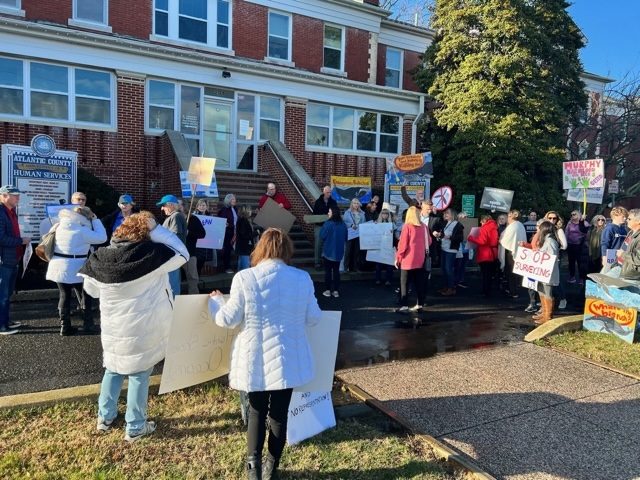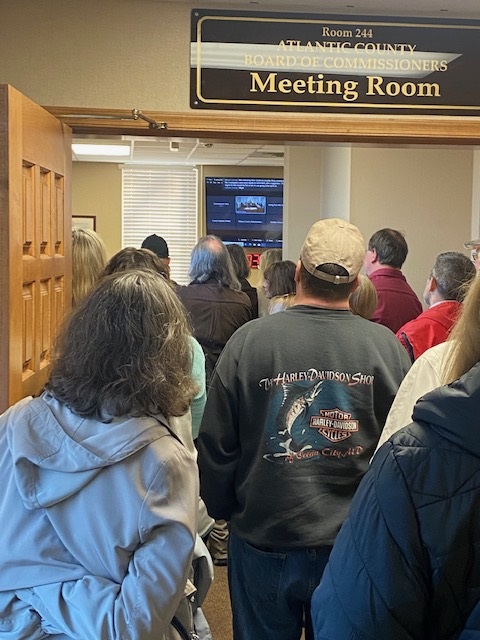
By NANETTE LoBIONDO GALLOWAY
After more than two hours of public comments, the Atlantic County Board of County Commissioners Tuesday approved a resolution supporting a moratorium on offshore wind development until such time as the cause of recent whale deaths is confirmed. The resolution was approved 7-2 across party lines.
The resolution, which calls for a “thorough investigation” into the cause of whale deaths and “other potential ecological disruptions,” will be sent to federal and state officials.
Before the end of the meeting, the resolution co-sponsored by Commissioners Frank X. Ballas and Richard R. Dase, both Republicans, was revised to limit the moratorium to 90 days, two months longer than the 30 days suggested by state Senate Republicans, including Sen. Vince Polistina, R-2.
“In my recollection, this is unprecedented,” Dase said.
Ballas said even more whales can be dying in the ocean and sinking to the ocean floor.
“We’re not against the idea of having offshore wind, but there are answers that need to be had,” he said. “We only have one ocean. If it’s ruined, we can’t replace it.”
Public officials, including 30 mayors of shore communities up and down the coastline, are asking for a pause in wind turbine development following the deaths of 10 whales in New York and New Jersey since December.
Some detractors of wind energy have said using sonar to map the ocean floor and seismic testing have disrupted the ability of whales to navigate the ocean safely, which may be leading them to become disoriented and getting hit by vessels.
“We believe the fastest and easiest way to determine if there is a link between wind farm development and the spike in whale deaths is to halt surveying for 30 days,” state Sen. Steven Oroho, R-24, said in a press release Tuesday.
He said a 30-day delay is a “small price to pay” to ensure “we’re being good stewards of our ocean environment.”
U.S. Rep. Jeff Van Drew, a Republican whose district includes the shore communities in Atlantic and Cape May counties, said earlier this week that he intends to hold a Congressional hearing on the matter sometime in March.
The National Oceanic and Atmospheric Administration has said there is no correlation between whale deaths and mapping the ocean floor to determine how deep the windmills can be planted.
The discussion at Tuesday’s commissioners’ meeting turned political as Democrat Commissioner Ernest D. Coursey said the county has no say in whether the project, approved through an Executive Order issued by Gov. Phil Murphy, goes forward.
“It’s a wasted resolution, because we have no say-so,” he said. “We’re playing politics with it.”
He called Polistina “a hypocrite of the first degree” and said he was using the whale deaths to grab headlines and “raise hell” to rally Republicans ahead of the next general election.
“Who’s fooling who? At the end of the day, we have no say-so,” Coursey said. “As senator, you have these people believing they can stop it. They can’t stop it.”
Commissioner Caren Fitzpatrick, a Democrat who has supported green energy for years and has attended “grass roots” educational sessions, said the whales could be dying from being hit by increased traffic from container ships speeding off the coast or redistribution of the whale’s food sources as a result of global warming.
“Labor issues on the West Coast has directed containers ships to the East Coast ports in New York and New Jersey, increasing the traffic on the East Coast,” she said.
Fitzpatrick touted the economic benefits of offshore wind, citing billions of dollars of investments in the South Jersey area, and the creation of thousands of good paying jobs for Atlantic County and South Jersey residents.
“This is a once in a generation opportunity for Atlantic County and southern New Jersey. Our population actually decreased from 2010 to 2020. We need a new industry in the region to share the burden of running the county,” she said.
Clean energy programs will create 11,000 new jobs and $34 billion in economic activity before 2050, she said.
Fitzpatrick said the Atlantic County Economic Alliance has supported offshore wind, which aligns with the county’s aerospace initiative, because skills needed to repair turbines are similar to those required for aircraft maintenance.
She called for federal officials to reduce container ship speeds and reduce the numbers of ships hauling cargo along the East Coast.
“This all started out with the problem of views from the beach, then we started having these tragic deaths, and it seems the community latched onto that as a way to move their agenda,” she said.
Commissioner James A. Bertino said regardless of the moratorium, it is likely the project will be built by the people “making money on it” and that they would ensure the project gets built starting in 2024.
Commissioner Amy L. Gatto suggested placing a time limit of 30 days or more on the moratorium to allow time for the results of necropsies on the dead whales to be revealed.
Ballas said the resolution was put on the agenda as a result of requests from Atlantic County constituents asking for action to delay the project until the cause of whale deaths is determined.
“When our constituents reach out to us, and if enough municipalities and counties pass resolutions similar to this, we can get the ear of the governor and even the president,” he said.
“This is about the people of Atlantic County who have reached out to me who are against it, and we were elected to be their voice, and I’m being their voice,” he said.
Polistina and Brigantine Mayor Vince Sera were first up to speak during public comments, followed by numerous individuals calling for the moratorium, and just a few speakers calling for a time limit on the moratorium.
Residents of Brigantine who spoke included representation by two local groups fighting the installation of up to 400 wind turbines they say will be 9 miles off the coast.
Several said they knew nothing about the wind farms until the whales started washing up on the shore. Many who spoke expressed concern about the integrity of those conducting the necropsies and investigations.
“I’m speaking on behalf of 30 mayors and 360,000 people in New Jersey. People want answers, and they want to know what’s going on,” Sera said, calling the project the largest in the world. “We want to make sure the project is being done correctly.”
He cited a report that indicates the wind turbines could warm up sustainable fisheries operating in the “cold pool” located off the coast of New Jersey.
“What we are asking for is to get answers to make sure there is no connection, and if there’s a better way to do these projects where it’s not going to harm our marine mammals or ocean environment, then let’s find it,” Sera said.
One woman said the project is nothing more than “industrialization of the ocean,” and that it would not eliminate the use of fossil fuels needed to operate the wind turbines.
George Plotnick of Point Pleasant said he loves New Jersey and its “God-given horizon of blue.”
Maryanne Ford of Brigantine said the “movement” promoted by two organizations in Brigantine is doing a great job spreading the word about the plight of the whales.
One resident said Gov. Murphy’s Executive Orders are “personally offensive” at all levels.
“We are the people. We elect the officials. We decide what happens, not an executive in a closed room,” she said. “I’m all for green energy … but these windmills haven’t proven themselves to anybody except the people who are making money off them.”
Several people said they do not trust the government to share information about the issue.
“How can the public trust the science, when that science is paid for by Big Wind,” said Peggy Dennison, a member of Defend Brigantine Beach. “These necropsies should be performed by independent and unbiased organizations.”
Patrick Armstrong of Longport said the U.S. Navy recently admitted that its sonar had killed 23 whales in a 24-hour period. He recalled that in the 1980s and early 1990s, dolphins washed up on shore as a result of ocean pollutants and medical waste being dumped in the ocean.
“We, the people, stopped this, and our beaches have never been cleaner,” he said.
A commercial waterman from Milmay and Somers Point, who called for an end date to the moratorium, said he has attended 40 wind energy and environmental public meetings over the last several years to learn about the projects, and that commercial fishermen have no concerns that the wind farms will have a negative effect on the fishing industry.
“I’m concerned about losing good paying careers for Atlantic County residents – careers that can’t be sold short. Do your due diligence, put a time limit on it, do the research and if you can’t find anything conclusive, let’s move forward,” he said.
After board Chairman John W. Risley Jr. closed the public comment period after two hours, with many more waiting to be heard, Balles recommended the board consider adopting a 90-day limit for the moratorium, which could be extended if necessary.
Vice Chairman Andrew W. Parker III said the resolution will likely be ignored anyway, so why put a limit on it.
The revised resolution passed 7-2, with Democrats Coursey and Fitzpatrick voting no.








